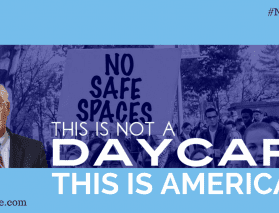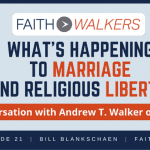I am pro-government.
There. I just shocked some of you into spewing coffee all over your keyboard. After you clean that up, allow me explain.
God made it clear through countless inspired writers of Scripture that He ordained government. In fact, he added a pretty sobering warning that whoever resists the authority of government, resists God. He also added that, should the two collide, we are to obey God rather than government. Unfortunately, because government is comprised of sinful human beings, we can expect it to drift off course pretty easily.
So I am pro-government. But I also support strong accountability to keep civil government (of all parties) from acting in a way that tramples the rights and freedoms of other God-ordained institutions such as the family, the church, or individual conscience.
Do Government Programs Produce Government-Friendly Voters?
But what happens when the chief means of holding our government accountable (voters)get used to receiving benefits from government systems, programs, and largess? At what point does our dependency on government programs create a conflict of interest for us as voters? Put another way, have government programs become so woven into the fabric of our lives that we’ve lost our perennial resistance to candidates promising to expand government programs? Yes, insert President Obama’s name here.
My point here is not to delve into a case-by-case study of each government program — I’m not even sure the federal government knows how many federal programs it has. But I think a case can be made that we have gotten used to having government, particularly — but not exclusively — the federal government, providing for a growing number of our most basic of needs. Consequently, more of us find it more difficult to vote for the candidate who promises to reform what we know to be unsustainable policies. We’ve gotten used to government providing more of the basic stuff of life.
To try to make my point, I’ll go in a direction few of you are expecting and some may not even appreciate. Schools.
Government education a case in point?
I don’t find it at all surprising that a growing number of voters who attended schools run by the government would be more likely to support more government involvement in their lives. Maybe it’s just me, but if, from an early age, something so basic as your education was provided to you by government employees at no apparent cost to you or your family, wouldn’t that make you more likely to support similar programs?
Would it really be that great of a leap to think government could handle your health care needs? After all, for many students in public (government-run) schools, the government also provides transportation, food via school-lunch programs, and after school care. What’s the big deal with them doling out prescriptions, as well?
I know, some of you are hyper-ventilating now, thinking I’m somehow attacking hard-working teachers or some such nonsense. I’m not. Criticizing a failing system? Absolutely. I understand education. Been there. Done that. In fact, in the private realm, we have to produce a superior product with a fraction of the funding available to public schools. And we do.
But my perspective is a little different than most precisely because it’s from outside the public-sector. I’ve partnered with countless parents who drove their own children to school every day — often at great expense and inconvenience. They packed their own lunches. And most of these parents were anything but wealthy. They paid their property taxes just like everyone else — then had to find a way to pay tuition, too. They sacrificed greatly to do it.
(Speaking of fairness, as I wrote here, how is that fair? Election consequence: progress on school vouchers came to a nearly complete halt with the re-election of President Obama, a staunch opponent of school-choice .)
I think some of my thoughts on the limits of government were shaped by my own education not depending on the government. My parents worked hard to ensure I got an education consistent with their faith outside of the public system. I worked my way through college without any direct government assistance. Took longer than most. But I suspect that experience contributed to why I see government differently than some, especially when it comes to schools.
I don’t think the federal government should be in the education business anymore than it should be in the automobile industry. Come to think of it, ever since they became more heavily involved in education, our nation’s achievement results have stopped climbing and our status in the world as an academic superpower has disappeared. And the more federal subsidies go to colleges, the higher the tuition. Anyone but the government would have been fired. But that’s the point. It’s hard to fire the government when its providing for your needs.
Government as first responder
For many in our culture, government is now seen as the first responder to life’s needs.
Students attending a public (government) school can be unwittingly conditioned in one of two ways:
- Passive. The simple fact that the government provides for such a significant portion of their life experience can subtly condition them to accept the government’s involvement in other areas of life. Parents can, and often do, push back against this notion, but it takes time and energy to do so — two things in short supply these days with most parents just trying to make ends meet. And it has to get confusing for students who are told by parents to show respect for teachers espousing ideas that parents say are bogus. Awkward.
- Active. Curriculum content is often influenced by government funding choices and comes from the top down through California (can’t think of a more government-friendly place) or Texas. The choices are often influenced by the teacher unions (government), and applied by teachers who have been trained by education departments in colleges that lean so far left they’re literally lying down on the job of training free-thinking educators. In other words, for those who attend most public schools, the deck is heavily stacked in favor of accepting more active government involvement in the future of society.
Whoever controls the schools, controls the future because children are the future. Like it or not. Right now, the government controls the schools.
We shouldn’t be surprised if government schools produce more government-friendly voters who embrace government programs their parents and grandparents rejected as unthinkable not so very long ago.
A little free-enterprise in our schools would be helpful right about now. Too bad that elections have consequences.
Ah, well. Let’s get back to work. Our children are counting on us.











